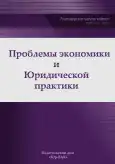Features of Family Legal Responsibility in the Russian Legal System
- Authors: Shepeleva D.V.1,2
-
Affiliations:
- Kutafin Moscow State Law University (MSAL)
- Financial University under the Government of the Russian Federation
- Issue: Vol 19, No 1 (2023)
- Pages: 125-130
- Section: Private Law (Civil) Sciences
- URL: https://journal-vniispk.ru/2541-8025/article/view/250110
- ID: 250110
Cite item
Abstract
The purpose of the study. The article discusses the problems of the need to strengthen comprehensive regulatory regulation of the protection of children's rights in families whose parents resort to violations of their duties, taking into account the strategic improvement and strengthening of family education. Every year in the Russian Federation, more than 30000 people become victims of crimes involving violent acts in the family. It is important to define the concept, the essence, subjective and objective signs of the family—legal responsibility in the system of family law, to study the place of family legal responsibility of parents in the system of legal responsibility and to establish the criteria of correlation with civil, administrative and criminal responsibility, to reveal the legal nature of family responsibility of parents. Conclusions. As a result of the conducted research, the author comes to a number of conclusions that directly affect the field of family legal duties and rights. The place of family and legal responsibility of parents in the system of legal responsibility is due to the independence of this type and a specific goal—to protect the interests of children. The criterion of correlation with civil, administrative and criminal liability is the severity of the offense committed and its nature. The legal nature of the family responsibility of parents follows from the fact of the existence of parental responsibilities, namely from the legal registration of paternity and motherhood. The leading task of family legal responsibility is to ensure timely response to family crisis situations, the active participation of competent authorities in solving emerging problems and minimizing negative consequences for the most vulnerable subjects of these legal relations—children. Courts actively apply various liability mechanisms, but, unfortunately, rarely resort to restorative procedures. There is a justification for this. Most of the measures that have to be applied to dysfunctional parents are based on the concern of the state for the possibility of ensuring a proper existence for an immature person—often, such parents lead an antisocial lifestyle that puts any human life in danger. It is simply not advisable to leave the younger generation in such conditions. Attempts are being made to work in the direction of providing proper psychological assistance, mechanisms for determining a family—but, for the most part, children «settle down» in boarding schools, where the conscious part continues to lead a dysfunctional lifestyle. It is important to stop these consequences.
Full Text
##article.viewOnOriginalSite##About the authors
Dina V. Shepeleva
Kutafin Moscow State Law University (MSAL); Financial University under the Government of the Russian Federation
Author for correspondence.
Email: dvshep0904@gmail.com
ORCID iD: 0000-0001-7661-4533
SPIN-code: 4109-6343
Cand. Sci. (Law), Associate Professor of the Department of Family and Housing Law; Associate Professor of the Department of International and Public Law
Russian Federation, Moscow; MoscowReferences
- Antokolskaya M.V. Family law: Textbook. 2nd edition, reprint. and additional M.: Jurist, 2000. p. 99.
- Bespalov Yu. F. The science of family law, rulemaking and law enforcement: some theoretical and practical aspects of interaction // Family and housing law. —2021. —№. 2. —p. 3–5.
- Bespalov Yu. F. Family relations and family disputes in the practice of the courts of the Russian Federation. Scientific and practical manual. —M.: Prospect, 2020. —224 p.
- Bespalov Yu.F. Some questions of the child's family capacity // Notary. 2005. №. 2. pp. 13–23.
- Bestugina M.A. Social conditionality and the purpose of civil liability in modern conditions: abstract. dis. ... cand. jurid. M., 1986. 24 p.
- Vorozheikin V.M. Family legal relations in the USSR. M., 1972. —pp. 254–334.
- Garipov R.F. Delictability: Theoretical and legal problems. Kazan, 2009. 93 p.
- Glushkova L. I. Responsibility in Soviet family law: Dis... cand. jurid. M., 1982. —p. 12.
- Grishaev S.P. Family law in questions and answers. M.: OOO «New Legal Culture», 2008
- Danilin V. I. Responsibility under Soviet family law. Ufa., 1980. —p. 5.
- Eleonsky V.A. Criminal punishment: the unity of retrospective and positive criminal responsibility // Questions of responsibility and punishment. Ryazan: Ryazan Higher. school of the Ministry of Internal Affairs of the USSR, 1987. pp. 72–84.
- Kazantseva A.E. Duties and rights of parents of persons replacing them) for the upbringing of children and responsibility for their violation / Edited by B.L. Haskelberg. Tomsk, 1987. p. 62.
- Kudryavtsev V.N. Legal behavior: norm and pathology. M.: Legal lit., 1982. 287 p.
- Lipinsky D.A. About some problems of the legal liability system // Law and politics. —2004. —№ 12. —p. 24.
- Nedbaylo P. E. System of legal guarantees of application of legal norms // Pravovedenie. —1971. —№. 3. —pp. 50–62.
- Nechaeva A.M. Offense in the sphere of personal family relations. M., 1991. pp. 58–62.
- Repeteva O.E. Legal responsibility for family, financial and environmental offenses as an intersectoral institute of law // Law and the State: theory and practice. —2010. —№ 3(63). —P. 136.
- Retyunskikh I.S. Criminal law relations and their implementation. Voronezh: Voronezh Publishing House. un-ta, 1997. 160 p.
- Sukharev A.Ya., Zorkin V.D., Krutskikh V.E. // Big Legal Dictionary., Moscow: INFRA-M, 1997. p. 781.
- Cherdantsev A. F., Kozhevnikov S. N. On the concept and content of legal responsibility // Jurisprudence. —1976. —№. 5. —p. 47.
Supplementary files








